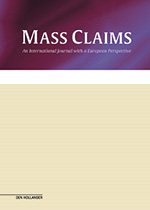Mass Claims
An international journal with a European focus
2023 nr. 1
Redactie
Hoofdredactie M. de Monchy
|
Redactie Susanne Augenhofer D. Duncan Fairgrieve J. Kortmann T. Schreiber I. Tzankova
|
Inleiding
Lincoln Frakes1Foreword
Spill a cup of coffee
Make a million dollars
sang Toby Keith in 2009, as he ironically listed things that make America what it is today. Referring to a fast-food customer who spilled coffee in the car on the way to work and won a large pay-out, his skepticism resonates today. Rarely does a week go by without headlines about mass claims. Without expressing a view on any particular case, it’s clear some personal injury and mass claim litigation, as portrayed in popular culture, is frivolous, trivial o... ...lees meer
Artikel
Daniel Juri1 While class action procedures are spreading around the world, the Swiss legislator is struggling to find a meaningful regime for collective redress. This article describes the current Swiss legal framework and explains why associative action has been a dead letter. It examines the Class Action Bill, which aims at bringing the associative action to life, and reflects on the criticisms voiced by various interest groups. It engages in a comparative analysis of the Australian and Swiss regimes and, drawing on three decades of experience with class actions in Australia, highl... abonneren of dit artikel .
Davine Roessingh and Jeroen de Boer1ESG is a broad concept entailing several – or: many – aspects of sustainable conduct. Mass claims based on private law notions have long been an instrument in pursuing interests that would nowadays be dubbed to be part of the developing field of ESG. The interplay between mass claims on the one hand and ESG on the other with many legislative developments as well as active regulators, academia and NGOs call for attention. To explore the role that mass claims can play in the context of ESG, court cases against the State and other public authorities must be considered as well as those again... abonneren of dit artikel .
Jeroen Kortmann and Till Schreiber1Rapporteur of the European Parliament's Committee on Legal Affairs on its Recommendations for responsible private funding of litigation abonneren of dit artikel .
Antonia Hotter and Florian Scholz-Berger1Workshop Report The national provisions transposing the Representative Actions Directive should have been adopted and published by December 2022. Despite that, numerous Member States have failed to do so. The Workshop "Organisation and Design of Collective Redress in Europe" dealt with the difficulties of transposing the Directive. After the enactment of the Representative Actions Directive in December 2020,[2] Member States had two years to transpose it into their national law. While many of them are currently... abonneren of dit artikel .
Keith Thomas and Tom Otter1Case Note: [2023] EWHC 398 (Comm) & [2023] EWHC 1169 (KB) Recent case law developments in England suggest that it may be possible for the English Civil Procedure Rule 19.8 to be applied more broadly than has previously been countenanced, at least in recent history, with a wider interpretation being used as to what might constitute the 'same interest' amongst a claimant group and the potential for bringing more claims on an "opt-out" basis. This represents a potentially major change to the usual "opt-in" case management arrangements generally used to manage large a... abonneren of dit artikel .
Overig
England and Wales, France, Germany, Italy, The Netherlands, Portugal, Spain
England and Wales
Anna Dannreuther
Case law
Município de Mariana v BHP Group (UK) Ltd [2022] EWCA Civ 951
The Supreme Court has refused permission to appeal in this case brought by 202,600 Brazilian claimants seeking compensation for damage caused by the collapse of the Fundão Dam. The owners of the dam, BHP, had applied to strike out the claims on the basis they were a... abonneren of dit artikel .
Vorige edities
2025
2024
2023
2022
2021
Eerdere edities kunt u doorzoeken in het archief.
 RSS
RSS



 RSS
RSS